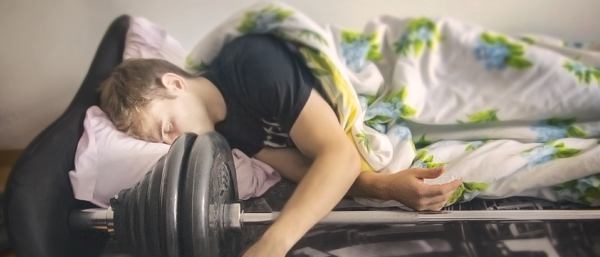This interesting article was written by our ambassador Lindsay Benson if you want to read more of her articles head over to her award nominated blog LeanBeanNurtition.
As well as nutrition, sleep plays a role in the recovery process post-exercise. Recovery is defined as the process which allows not only the muscles and connective tissues to repair but it also initiates the adaptive response to training which is essential for optimal performance and athletic improvements. Jeffreys (2005) defines recovery as the ability to normalise physiological functioning (Blood pressure, heart rate), return of cellular homeostasis, replenishment of cellular energy enzymes and the restoration of energy stores (muscle glycogen). Recovery from training is required for the repair of damage caused to the body by training or competition and allows the body to return to normal condition. Effectively managing individuals recovery process can allow the athlete to undertake higher training intensities &/or larger volumes of training whilst minimising the risk of over training (Bishop et al, 2007). Keeping in mind that one recovery strategy will not be effective across a broad spectrum of athletes, as individual difference mean that each recovery strategy is tailored to that individual. Many athletes employ various strategies to promote fast and effective recovery post exercise, particularly important for those who train twice a day or on consecutive days.
The most simplistic recommendation of recovery is sleep. Both quantity and quality of sleep plays a vital role in athletic performance, however it is evident that many athletes experience compromised sleep (Halson, 2014). It is recommended to receive ~8 hours of sleep per night, and that compromised sleep can lead to changes in glucose metabolism, altered food intake, reduced appetite and changes in protein synthesis which can impact on the individual’s ability to adapt and recover effectively from training. A number of neurotransmitters that have been identified to impact on the sleep-wake cycle (serotonin, melanin-concentrating hormone, orexin, gamma-aminobutyric acid). The utilisation of nutritional strategies to target these neurotransmitters could potentially impact on sleep quality and quantity. Carbohydrates, tryptophan (protein: amino acid) and melatonin are some nutritional interventions that have been investigated as possible sleep inducers. Nédélec et al (2015) reported that the consumption of fluids high in electrolytes, carbohydrates (high GI) and protein immediately prior to sleep with the addition of tart cherry juice concentrate may help promote recovery and sleep via rehydration, replenishment of substrate stores, and help in the repair of muscle damage.
Although literature to date is intriguing, more research is needed to explain the mechanisms and potential health benefits of these products. Several studies have found positive benefits of consuming tart cherry juice, however the effects are closely linked to their absorption and metabolism. Anthocyanin’s are the main component found in montmorency tart cherries a type of phenolic acid which has been shown to project anti-inflammatory properties (Howatson, 2011). Montmorecy cherries, a particular type of cherry, have been shown to have the highest concentration of melatonin (Burkhardt et al 2001), a potential facilitator of sleep (Cajochen, Kräuchi, & Wirz-Justice, 2003)
Adopting good sleep hygiene is the best advice: setting a fixed time to go to bed, turning of electronic devices, avoiding caffeine, relaxing before going to bed and if it takes your fancy a nice glass of cherry juice.
Bishop, P.A, Jones E., & Woods A.K. (2008). Recovery from training: a brief review.
Journal of Strength and Conditioning Research., 22(3):1015-1024
Jeffreys, I. (2005). A multidimensional approach to enhancing recovery. Strength and Conditioning Journal. 27(5): 78-85.
Nédélec, M., Halson, S., Delecroix, B, Abaidia, A., Ahmaidi, S., & Dupont, G. (2015). Sleep hygiene and recovery strategies in elite soccer players. Sports Medicine. 45(11)1547-1559. DOI: 10.1007/s40279-015-0377-9
Halson, S. (2014). Sleep in elite athlete and nutritional interventions to enhance sleep. Sports Medicine. 44(1)S13-23 doi: 10.1007/s40279-014-0147-0.
Howatson, G., Bell, P., Tallent, J., Middleton, B., McHugh, J. (2011). Effect of tart cherry juice (Prunus Cerasus) on melatonin levels and enhanced sleep quality. European Journal of Nutrition.DOI 10.1007/s00394-011-0263-7
Cabochon, C., Kräuchi, A., & Wirz-Justice, A. (2003). Role of melatonin in regulation of human circadian rhythms and sleep. Journal of neuroendocrinology. 15(4), 432-437. DOI: 10.1046/j.1365-2826.2003.00989.x
Burkhardt S, Tan DX, Manchester LC, Hardeland Rd, Reiter RJ (2001) Detection and quantification of the antioxidant melatonin in Montmorency and Balaton tart cherries (Prunus cerasus). J Agric Food Chem 49(10):4898–4902. doi:10.1021/jf010321?
______________________________________________________________________________




